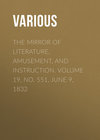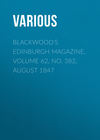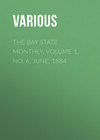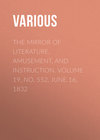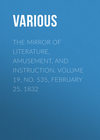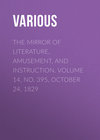Loe raamatut: «Graham's Magazine Vol XXXII No. 6 June 1848», lehekülg 4
"As you please," said he. Now you must know that I was the only one that treated Cousin Jehoiakim kindly. Sister Anna and Brother Dick made a complete butt of him; the rest did not treat him at all, except to an occasional shrug of the shoulder from Anna's lieutenant, or a gay laugh from little Fanny. And, forsooth, because I was civil to him, and talked to him, and excused his awkwardness, why Edgar saw fit, in his wisdom, to be jealous of him. Was there ever any thing more absurd? Yes, since time out of mind have men, the wisest and the best of them, been just so absurd; and unto all eternity will they, the wisest and best of them, be just so absurd again.
By the time we had reached again the spot, the others had come up, and were engaged in disentombing the imbedded unfortunate.
"That was a cold bed, any how," said he, shaking himself from head to foot like a huge Newfoundland dog, and smiling upon us with his imperturbable good-nature; "but why, in the name of all that is good, did you not help a feller out sooner? If it had been feathers instead of snow, I should surely have been suffocated."
"Thank your stars for your safe deliverance," said the laughing Fanny.
"What were you thinking of, cousin?" said Anna, in a choking voice.
"I could think of nothing but the ten commandments; and I wondered what sinful iniquity my grandfather had been guilty of, that I should be visited in such an awful manner for his transgressions. But where on earth is my hat? I have looked in the hole, and all about for it."
"Look on your neck, Hoiky; you are wearing it for a stock," said my brother.
"By gracious! so I am."
I brushed the snow from his shoulders and hair, and assisted his long neck from its cumbrous stock, and pinning on the crown-piece, the hat was quite wearable again.
"Mr. Johnson will ride much more comfortably in one of the double-seated sleighs," said Edgar.
"Most certainly, Mr. Elliott," replied Cousin Jehoiakim, "you know I begged you to let me out the first sleigh we met. I reckon you did let me out to some purpose at last. By jimminy! but that was a cool dip. Wall, Cousin Anny, what do you say to my riding along with you, though I had a leetle rather sit alongside of Clarry, yet if you've no objections I havn't none."
So now was my turn to pay back my sister by as provoking a toss of the head as she gave me. Our ride the rest of the way was pleasant. Edgar's eyes grew warm and loving. Among the other interesting things we talked of, Edgar poured into my greedy ears the wonders and beauty of the almost new doctrine of the transcendentalists. He described the home he was going to give me, and called me his little wife, and said – but dear me, I am not going to tell you all he said. His passionate words and the love in his soul-full eyes lay deep in my heart as we stopped before Squire Brown's.
Then came the dressing, and then it was we found that Cousin Jehoiakim had contrived to crush the great bandbox on the seat beside him. The beautiful lace dress Miss Elliott was to have worn over a satin was torn and spoiled, also Anna's and my wreaths, also things too numerous to mention. When we told of the disaster, Brother Dick said that Anna and I looked much prettier in our own uncovered hair than with an artificial flower-garden upon our heads – that the elegant white satin of Miss Jane needed no lace to make it more beautiful – adding, in an undertone, that he would give more to see a woman dressed in the simple white muslin his little Fanny wore than for all the laces and satins that could be bought.
When we entered the ball-room we found Cousin Jehoiakim already dancing with a red-haired young lady, in a blue gauze dress. Seeing us, and wishing to astonish us, he attempted a quadruple pigeon-wing, which unfortunately entangled his great feet in the blue gauze dress, and ended in his own subversion and the dismemberment of the thin gauze. The young lady was obliged to retire for the night, while Cousin Jehoiakim slowly picked himself up. He was so much abashed I had to console him by asking him to dance with me. I really pitied the poor fellow, he could get no one but me to dance with him, still he tried so hard to make himself agreeable, and was so determinedly good-natured that it was not his fault that he could not be a second Apollo.
I was Edgar's partner for a reel.
"You seem to take very great interest in the well-doing of that odious cousin of yours," said he.
"Poor fellow! why should I not?" replied I.
"Because he is awkward and disagreeable," said he, half laughing at his own reason.
"He is as the Lord made him," replied I, in a tone of affected humility.
"But the Lord did not make you to dance with him and lavish so much attention upon him; you will oblige me very much, Clara, by not dancing any more with him and making yourself so ridiculous."
Now there was not very much in those words to take offence at, and I should, like a submissive woman that was about to be a wife, have promised obedience, but, unfortunately, being a daughter of Eve I inherited somewhat of her pride and vanity. In a different tone of voice Edgar might have said even those words without offending either pride or vanity, but his voice was cold, and his eyes were colder, and I, driving my heart away from my lips and eyes, replied – "I trust Mr. Elliott does not flatter himself he has yet the entire control of my actions."
"Just as you please."
The reel was finished, and he was off. I repented as soon as the words passed my lips – the first angry words I had spoken to him. But then, thought I, sitting down on a bench by myself, why is he so foolishly provoking and unreasonably jealous of my poor cousin. He to be so unkind, he who had ever been the noblest and most loving of sons, the kindest and truest of brothers. For a moment my heart misgave me at the thought of becoming his for life, it was only a moment. I saw through the dim vista of years a vision of peace and love.
Cousin Jehoiakim came and sat down beside me. "Ah! Cousin Clarry," said he, abruptly taking my hand and holding it, "you are good and kind to me, how happy I shall be when you are my own little wife, when the time comes to give you my hand as I already have my heart."
Cousin Jehoiakim sentimental! I looked up – Edgar's cold blue eyes were fastened upon me. I hastily drew my hand from my cousin, and sprung toward the glooming Edgar.
"Is it not near time to go, dear Edgar?" exclaimed I, grasping his hand in my own.
"Mr. Johnson can see you home. I have engaged to go with a friend of mine back to Boston."
"Edgar!" – but he was gone.
You may depend I did not ride home with Mr. Johnson, but begged a seat with my sister, leaving my cousin the "pung" with the gig-top all to himself. Whether he encountered any more stumps or pit-falls I cannot say. He and the pung came safely home, as did the rest of us.
"Mother," exclaimed I, "I do wish you would contrive some means to get rid of my odious Cousin Jehoiakim, he is the torment of my life."
"Mamma," chimed in Anna, while a smile twinkled in the corner of her eye, "Cousin Jehoiakim has ruined my beautiful French wreath, and has broken my Chinese pagoda, and my exquisite Chinese mandarins, and soiled my Book of Beauty, and has broken my new set of chess-men that Uncle Eb. brought from the East Indies, and has – dear mother, can you not think of some means of sending him to Uncle Abiram's, or to Halifax?"
"Yes, mother," said Brother Dick, with a laugh, "Hoiky has been here mischiefizing long enough; do invent some means of packing him off. We have been victimized long enough. He has broken every fishing-rod I have, and has lost my hooks, and he has lamed my beautiful pony Cæsar, and ruined my gun, and yesterday, in shooting game, he shot my dog Neptune, that I have been offered fifty dollars for, and would not have taken one hundred."
"Wife," said our dear papa, coming into the room, "it is of no use, I can be patient no longer, you must devise some method of letting Nephew Jehoiakim understand we do not wish his presence any longer. Poor fellow! I would not for the world be unkind to him. I will give him an annual stipend that will support him liberally during his life, willingly, gladly, but I cannot have him here any longer. He is utterly incorrigible."
"What has he done now?" asked our dear mamma.
"He left the bars down that led into my largest, best field of wheat, and half the cattle in the country have been devouring it. They have ruined at least a couple of hundred dollars worth. The money is not what I care so much for, but it was the best wheat-field for miles around, and I had a pride in having it yield more than any field of my neighbors. I have borne with him day after day, hoping he might do better. Poor fellow! he is sorry enough always for his mistakes. The other day he left the garden-gate open, and the cows got in and eat all my cabbages and other vegetables; then he leaves the barn-door open, and the hogs go in and the calves come out."
"We will see," said our dear mamma.
The next morning at the breakfast-table said our dear mother —
"You will have a delightful day to ride in, dear nephew."
Cousin Jehoiakim opened wide his eyes, inquiringly.
"Richard, my son, I hope you did not forget to tell Mr. Grimes to let the stage stop here this morning. It will be very inconvenient for your cousin to be obliged to stay another day. I packed your trunk this morning early, dear nephew, just after you left your room, knowing how you disliked the trouble."
Still wider opened my cousin's eyes.
"Harry, my son," said mamma to my little brother, "those cakes and dough-nuts are for your cousin to take with him for his lunch."
"Mayn't I have a piece of pie then?"
"Go and get what you want of Mercy, my dear. I put some runs of yarn in your trunk, dear nephew, you may give them with my love to sister Abigal, and tell her the wool is from white Kitty. She will remember the sheep. Give my love to brother Abiram with this letter."
Still wider opened Cousin Jehoiakim's eyes.
"You will find also in your trunk a dozen and a half of new linen shirts that I have taken the liberty of putting there instead of your old ones."
"Thank you, dear aunt, you are very kind. I really am very sorry to leave you all. I have enjoyed myself very much here; but Aunt Abigail will feel hurt if I do not pay her a visit. I shall come again as soon as I can, so do not cry your eyes out, Cousin Clarry."
The stage came and Cousin Jehoiakim went.
And the way I lured back my flown bird would make quite an interesting sentimental little story of itself. Bless his bright eyes! they are shining on me now, full of mischief at this sketch I am giving you, beloved reader. But didn't we have a nice wedding time? There was Anna and her brave lieutenant, Brother Dick and his bright little Fanny, the beautiful, majestic Jane, and my beautiful, majestic Cousin Clarence, and my darling, good Edgar, and, dear reader, your very humble servant.
CORIOLANUS
BY HENRY B. HIRST
How many legends have been told or sung
Since Rome – the nursling of the wolf – arose,
Lean, gaunt and grim, and lapped the bubbling blood
Of fallen and dying foes.
How many lyrics, which, like trumpets heard
At dawn, when, clad in steel, the long array
Of marshaled armies glittering in the sun
Stretch, like the skies, away.
But none so golden, chivalric and holy
As that of thine, Coriolanus – none
In the imperial purple of old days
But pale before its sun.
True, thou wast proud, and deemed the people base,
Prone to idolatry of those who sought
Their April smiles – who fawned to win their votes,
Nor dreamed them dearly bought.
Thou, who hadst stood where death reigned like a king,
First in Corioli – thy wounds in front —
Preferring neigh of steed and clash of arms,
The battle's deadly brunt,
To silken ease, and mirth, and song, and dance,
And festal follies in Etruscan halls —
Bacchantic revels, when the sun went down,
Beyond the city walls,
Couldst well gaze on the mass with eagle eye,
Demanding as a right their voice, and blush
To bare thy scars, while thy patrician scorn
Made cheek and forehead flush.
The base cabals – the hate which drove thee forth
A wanderer, ennobled thee: thy fame
Looked lightning on the curs that dared abuse,
But lacked the power to shame.
Prouder thy spirit in that trying hour
Than theirs who stung thee: well might'st thou go forth
Undaunted, for thy fame was not of Rome,
But, rather, of the earth.
Yet it was hard to leave thy wife and babe —
Virgilia and thy little one – hard to break
The bonds that held thee to them: Rome grew dear —
Most dear for their sweet sake.
But as their forms waxed dim, thy festering heart
Looked from thine eyes; thy swelling nostrils told
The inward struggle, and thy heaving chest
A human ocean rolled.
Kneeling upon the ground, thy sinister arm
Adjuring heaven, thy soul broke forth in tones
Of thunder; but thy agony in that hour
Pale Rome repaid with groans.
Coldly, with stately step and placid brow —
A lull – the herald of the approaching storm —
Thou went'st thy way toward Antium – trod its streets
Without the thought of harm.
Humble was thy approach, but thou went'st forth
A Mars of the time – thy snorting steed arrayed
And glistering with gold, while at thy heels
A thousand clarions brayed.
Rome from her seven hills looked down with fear,
Appalled and breathless, while her people stood
Like men awoke from sleep, amazed, aghast —
With agues in their blood.
Like an avenging angel with the sword
Of wrath unsheathed, careering toward thy home
Through flame and blood, thou rod'st: thy coming shook
The hundred gates of Rome.
She, who abused, beseeched thee, but in vain —
Humbled herself before thee; yet thy hate
Was unappeased; and, like one stricken dumb,
Rome gazed upon her fate.
But when Volumnia came – thy mother – she
Who bore thee 'neath her heart, and, at her side
The one who, in thy softer hours, with love
Thy trembling lip called bride,
Leading thy child – thy boy – the old hours came
Like south wind over thee; thy icy soul
Dissolved in tears; thy hard – thy iron heart
Acknowledged love's control,
And Rome was saved – Rome, who had wronged, was free!
– Thou lost! – O, never from the depths of Time
Came sweeter record of the power of love
Than this, in my poor rhyme.
Never was story fuller of the strength
Of love o'er hate: undimmed by age, it breathes
A perfume, and a crown around thy brow,
Coriolanus, wreathes!
LENNARD
A TALE OF MARION'S MEN
BY MRS. MARY G. HORSFORD
– "Mightier far
Than strength of nerve or sinew, or the sway
Of magic potent over sun or star
Is Love, though oft to agony distrest,
And though his favorite seat be feeble woman's breast."
I
Night o'er the Santee! up the sky
The pale moon went with misty eye;
And in the west a brooding cloud —
Departed day's wind-lifted shroud —
Waved slowly in the depths of blue,
While now and then a world looked through
The broken edge, as from above
Steals down a seraph's glance of love,
Through sorrow's cloud and mortal air,
On breaking hearts or tearful prayer.
II
Within the recess of the wood
That on the river's margin stood,
Encamped beneath the shade
Of solemn pine and cypress tree,
And tulip soaring high and free,
A patriot band had made
Their pillows of the moss and leaves,
Through which the moaning south-wind grieves
When day forsakes the glade.
And all save one slept hushed as night
Beneath the starry Infinite —
That one a boy in years,
Whose daring arm and flashing eye,
When death and danger hovered nigh,
Belied the trembling fears
And shrinking dread that seemed to speak,
From quivering lip and pallid cheek
At sight of war's array;
The first the fearful strife to bide,
Forever at his captain's side,
Was Lennard in the fray;
Yet strange to tell, though oft beside
That captain's form he dared to bide
The cannon's fiery blast,
His hand no human blood had shed,
Beneath his steel no foe had bled,
When in the battle cast.
So said his comrades tried and cold,
Who marveled that a heart so bold,
Should beat in pitying breast.
And now beside the smouldering fire,
He marked its flickering flames expire,
And watched his leader's rest.
III
That leader – in the civil strife
Then waged for Liberty and Life,
No braver spirit stood,
Between his country and the chain,
Mistaken tyranny would fain
Have cast o'er lake and wood;
And though in manhood's early morn,
Young Huon led through strife and scorn
A trusty troop and free,
Who left their homes his lot to share,
For Freedom sworn to live and dare,
Or die – at Fate's decree;
And from the covert solitude
Of dark morass and thicket rude
Guerilla warfare waged,
On Tory band, unwary foe,
And struck full many a dauntless blow,
While hate and conflict raged.
IV
One hour from midnight and the sleep
That wrapped the stalwart frame so deep,
Was woke by guard and sign;
The forest sounded with the tramp
Of rushing steeds, until the camp
Was reached by foremost line
Of the brigade of fearless men,
Who rode through wood, and brake, and fen,
As speeds the red deer to his glen.
No gorgeous suit of war array,
No uniform of red or gray
In that rude band were seen;
The ploughman's dress, but coarse and plain,
And marred by toil with many a stain,
Betrayed no gilded sheen;
Their only badge the white cockade,
No dagger's point or glittering blade
Was worn with martial pride,
But sabre hilt and rifle true,
Oftimes of dark, ensanguined hue,
Were ever at the side.
They hailed their comrades in the fight,
With blazing fires illumed the night,
And waged with jest and smile,
As toward the lurid torches' light
Rode up their chief the while.
No pert gallant or Conrad he,
With gay plume waving haughtily;
Nor donned he aught his troopers o'er,
Save that the leathern cap he wore
In front a silver crescent bore,
Inscribed with "Death or Liberty."
Of stature low, the piercing eye,
And forehead broad, and full, and high,
And lined with lofty thought;
Were all that marked from his compeers,
The man who through long, gloomy years
With tireless vigor wrought,
Nerved by defeat for loftier aim,
To build his country's Hope and Fame,
And win for her a seat divine
Beneath bright Freedom's hallowed shrine;
And few, though rashly brave, would dare,
To start the Swamp Fox2 from his lair.
Or in his fastness wild and dun,
Cope with the rebel Marion.
V
Soon Huon by the river's tide
Sought out his brave commander's side,
And listened with respectful air,
To learn what new emprise to share,
What lurking foe to shun or brave.
Short was their conference and grave,
Ere Huon bade a trooper call
His page, young Lennard, to his aid;
And passing 'neath the cedar tall,
And giant oaks' far spreading shade,
The boy with graceful step and light,
Stood quickly in his captain's sight,
And Marion thus, in kindly tone,
Spoke with a frankness all his own.
"'T is said, my boy, thy heart is brave,
Thy courage sure, and caution grave;
This night, then, we will task thy power.
Seek, ere the closing of the hour,
The village inn that stands below,
Embowered within the coppice glade,
And learn the bearings of the foe —
Their force in camp, and field, and shade;
But ere the silver moon again
O'er Carolina's hills shall wane,
Meet us beside the deep lagoon
Beyond, that knows no scorching noon."
VI
Anon, far down the silent wood,
Undaunted by its solitude,
Sped Lennard on his way;
Until beneath a blasted pine,
Beyond the forest gray,
That tall, and bald, and hoary white,
Gleamed through the dusky veil of night,
As through Life's mist on human sight
Gleams vital truth divine,
He paused, and from a whistle clear,
Drew notes that thrilled the valley near.
VII
Within the rebel camp, meanwhile,
No slumbers winning smiles beguile,
From care to dreams away;
The troop who view with fearless heart
The coming strife and battle's mart;
And thus with blithesome song, though rude,
Awake the echoes of the wood:
Though dark the night,And fierce the fight,
We fear no living foe;
The swamp our home,The sky our dome,
Our bed the turf below;
We hail the strife,And prize not life,
Unblessed by Freedom's smile;
And Age and Youth,To patriot Truth,
Pledge hopefully the while.
Our Country's nameMust sink in shame,
Or sound in triumph free;
Then, brothers, on!For Marion,
Our homes and liberty.
VIII
'T was morning – from the golden sky
Night fled before day's burning eye,
As flies the minister of sin
From souls that kneel to God, to win
Courage to meet the tempter's wile,
And strength upon the strife to smile.
Scarce had the cloudless sun betrayed,
The flowers that bloomed in meadows low,
Ere toward a thickly shaded glade,
An armed horseman traveled slow;
And paused beside a gushing spring,
Whose gentle murmurs thrilled the air,
As thrills an angel's unseen wing
The distant blue when mounting there.
The dark trees hung above its wave,
A tapestry of green,
And arching o'er the waters, gave
A softness to the sheen
Of mellow light that darted through
The dewy leaves of richest hue;
While round the huge trunks many a vine,
Had bade its graceful tendrils twine;
The blossoming grape and jessamine pale,
Loading with sweets the summer gale.
Not long with hasty step he trod
The narrow path and flowery sod,
Ere gently o'er the sere leaves' bed
A maiden passed with faltering tread.
IX
Oh! light was the step of the blooming girl,
And glossy the hue of the raven curl,
And joyous the glance of the dark eye's play,
When the pride of the village was Morna Grey.
But ruthless war to her dwelling came,
Her brothers slept on the field of fame,
Her father's blood on his hearth was shed;
And the desolate orphan in anguish fled
To the cottage of one who her childhood nursed,
And who soothed the spirit that grief had cursed;
And now in the depths of that speaking eye
There slumbered a sadness still and high,
But veiled with a clear and mellow light,
Like the softened glow of a moonlit night;
And the rose on her cheek that came and went,
Like the hues of the West when day is spent,
Told how the chords of the heart below,
Quivered and shrunk at the breath of wo.
But why did a presage of coming ill,
With a fiercer pang her bosom thrill,
And pale her cheek to a deadlier hue,
As she sought the spring where the jessamine grew?
She had come to meet for a moment there,
Ere he sought the field in the strife to share,
One who her father had blessed in death,
As she pledged her faith with faltering breath;
And Huon with joyous smile and gay,
Welcomed the presence of Morna Grey.
X
But the words they spoke were short and few —
A soldier must be to his duty true;
And ere a half hour had hastened by,
She watched his steed as it hurried nigh,
O'er the verdant plain to the cedars tall,
Where his men were waiting their leader's call.
As she dashed the drops that dimmed her sight,
From the dark-fringed lids where they trembled bright,
A rustling was heard in the brushwood near,
And a crone, whose wild and fantastic gear
Betrayed the erring of mind within,
Stood in her presence with mocking grin.
"Said I not sorrows in dark array,
Crowded the future of Morna Grey?
Why from the cheek do the roses fly?
Where is the light of the flashing eye?
Where has the rounded lips, ruby red,
Gone, since we parted beside the dead?
The white owl entered the casement high,
O'er the brow of the dying I saw it fly;
Presager of death! I hailed its wing,
She scorned the omen but felt the sting
Of bitter grief, when another day
Bore her angel Mother from earth away.
I warned her, when on the coming blast
I saw the phantom-like shades flit past;
She smiled on my words as idle play,
But wept when her sire, in the midnight fray,
Felled to the dust by the Tory's blade,
Died in the home where his bones are laid;
When the cold drops stood on the forehead fair,
And the curdling blood on the thin, gray hair.
But the dead in silence forgotten sleep;
She is weaving on earth a vision deep,
Of joyous hopes that must fade and die,
Like the bow that smiles when the tempests fly,
In vain the strength of her youth is shed,
In a path where she trembles and fears to tread;
In vain – in vain would the fragile form,
Brave the hot breath of the cannon's storm;
The bullet speeds on its mission free —
A broken heart and a grave I see."
"Though dark my way, I fear it not;
Speed, woman, to thy sheltered cot,
Lest thou, with no protector nigh,
Should catch some hostile wanderer's eye.
My trust is in that mighty Power,
Who rules the battle's wildest hour;
And woman's love is like the flower
That bloometh not in sunny bower;
But when the dark and solemn night,
Has gathered round with storm and blight,
Unfolds its petals bright and rare,
And sheds its fragrance on the air;
And if it dare and peril all,
Asks only to preserve or fall,
His bleeding land requires his arm —
God will protect the brave from harm."
"Behold!" and Morna turned to gaze
Upon the huge tree, dark and lone,
The withered finger of the crone
Marked out, and glancing in the rays
Of morn, beheld a serpent coil
Its glossy length, with easy toil,
Up the brown trunk, till close it hung
Above the wild bird's nest and young;
While round and round, with scream of dread,
The frighted bird in anguish fled;
And vainly sought to drive the foe
From his dark aim again below.
XI
Moments there are when Reason's control,
Yieldeth to Fancy in heart and soul;
When the spirit views with prescient eye,
The common light and shaded sky,
An omen finds in the falling leaf,
And symbols in all things of joy or grief.
And this was one, for on that failing strife
Had Morna cast her dearest hope in life.
Must she behold with power as vain to shield,
Earth's only blessing from her presence torn?
Was there a fiercer pang for her revealed
In that short conflict than she yet had known?
Her dark eyes grew more wildly bright,
And gleamed with an intenser light,
As closer drew the venomed fang,
And shrill the lone bird's accents rang.
But, hark! a shot – a rustling fall —
Approaching steps – a sportman's call —
The parent bird is in the dust;
And o'er the path that homeward led,
With fleeting step fair Morna fled,
And breathed a prayer of thanks and trust.
Though sweet to live, more blest to die,
For those that strong affections tie
Has fettered to the clinging heart,
With links not Death can wholly part.
XII
The day wore on, and down the West,
The sun had rolled in his unrest;
While gorgeous clouds of gold and red,
Reflected back the splendor fled;
And twilight – pensive nun, to pray,
In silence drew her veil of gray.
The last bright gleam was waxing pale,
And low night winds began their wail,
When near a ruined house, that stood
Within a grove of tulip wood,
Young Lennard paused and gazed awhile,
With clouded brow and saddened smile,
On trampled flowers, and shrubs, and vine,
Torn from the pillar it would twine
With verdant bloom, and casting round
Its scarlet blossoms on the ground.
A waste of weeds the garden lay,
And grass grew in the carriage way;
Cold desolation, like a pall,
Had spread its mantle over all;
Yet not the creeping touch of Time,
Had wrecked that dwelling in its prime.
The fierce and unrelenting wrath
Of human war had crossed that path,
And left its trace on all things near,
Save the blue sky above our sphere.
Anon, with hurried step and free,
He crossed the ruined balcony,
And passing by the fallen door,
Stood on the dark hall's oaken floor.
Lighting the pine-torch that he bore,
He watched its lurid beams explore
The gloomy precincts, and passed on,
As one who knew each winding well,
To a low room that lay beyond,
And echoed to the south wind's knell.
Upon the threshold crushed and lone,
By rude marauder's hand o'erthrown,
The holy volume lay;
He raised it from its station there,
And smoothed the crumpled leaves with care,
Then sadly turned away
To gaze upon a portrait near,
Whose thoughtful eyes, so calm and clear,
And chastened look and lofty mien,
And forehead noble and serene,
Told of a spirit touched by time
Only to soften and sublime;
Of woman's earnest faith and love
Surmounting earth to soar above.
XIII
With quivering lip the boy gazed long;
Unheeded and unmarked a throng
Might there have met, so fixed his soul
On Memory's unfolding scroll.
He knew not that the hours crept by,
And sullen grew the deepening night;
Again he met his mother's eye,
As erst in joyous days and bright,
And heard the accents clear and mild,
Now hushed in death, breathe o'er her child
A fervent blessing and a prayer;
Again his father's silver hair
Gleamed on his sight, although the tomb
Had closed him in its rayless gloom.
XIV
His leathern cap aside was flung,
And o'er his brow the dark locks hung
In wild confusion, as he stood
Amid that haunted solitude,
Raising the blazing torch to throw
Upon the pictured face its glow.
In him a careless eye might see
A semblance of that face in life;
With more of fire and energy
To brave the storm and strife;
With more of earthly hope to claim,
And less of Heaven – yet still the same.
XV
But suddenly the mystic spell
That bound him to the Past was rent;
The vivid lightning, forked and red,
Flashed through the broken casement, blent
With the loud thunder's awful roar,
Prolonged and echoing o'er and o'er.
The warring of the world without
Offended not the struggling heart;
Roused from the apathy of thought
He sought the casement with a start,
And watched the raging storm sweep by
With kindling cheek and flashing eye.
XVI
On! on! it came with fiery breath,
Instinct with rage and winged with death,
As downward swept, ere Time begun
His swift and varied race to run,
Through realms chaotic and sublime,
With wing of light and forehead pale,
Immortal in remorse and crime,
Thrilling the Infinite with wail,
The apostate troops from lands of light
To darkness, shame and withering blight.
On! on! it came, and in its path
The tall trees bent beneath its wrath,
And fell with hollow, crashing sound,
Torn and uprooted, to the ground.
Still nearer grew the lightning flash,
And heavier broke the thunder crash;
And as, with almost blinded gaze,
Watched Lennard the electric blaze,
He saw through rain and densest night
A thin, pale line of waving light
Speed to a lofty oak, whose head
Sunk powerless to its parent bed.
XVII
The hours passed on – the storm had spent
The fury to its madness lent,
And wild and sullen clouds on high
In broken masses swept the sky,
As Lennard left the ruined hall,
And, bounding o'er the garden wall,
Walked swiftly o'er the lonely plain,
Till 'neath the blasted pine again
He paused, and blew the whistle low;
Soon from a clump of firs below
An aged servant slowly led
A saddled steed: the pale moon shed
Its fitful gleam as Lennard sprung
Light to his seat, then fearless flung
The bridle loose, and spurring, soon
Drew up beside a deep lagoon,
Whose stagnant waters 'neath the moon
Glimmered through bush and hanging vine,
And cypress bald and ragged pine.
Concealed within the spectral gloom,
Of wide morass and forest tomb,
His comrades there he found;
By many a devious winding led,
Where the pale fire-flies' torches shed
A fitful gleam around,
He paused at length where Huon stood,
Amid his faithful band, though rude,
And thus his errand told:
"Where bends the Santee in the plain
Has Tarleton's troop encamped again,
With careless movement bold;
One half his men will march to-night
To join the troop on Charleston height,
The guard will be both dull and light;
A few short hours, with speed and care,
Must lead us to the station there."
XVIII
His mission o'er, with thoughtful look,
The boy sought out a shaded nook,
Apart from all – yet near
The opening where the men had laid
Their rations on the mossy glade,
Beside the swamp-marsh drear.
Silent was he, reserved and shy,
Seldom raising cap or eye;
Not many days since first his hand
Had joined him to that patriot band;
Yet none more truly did fulfill,
The duties of his arm required,
Though slight withal, and often still
When the loud signal-gun was fired,
The herald of the coming fight,
His cheek would pale like flowers at night
Beneath the autumn's chilling blight;
None knew his residence or name,
Save that of Lennard, which he told
The morn when to the camp he came,
And begged that he might be enrolled
In Huon's corps, to serve with those
Who bled to heal their country's woes;
Of late his arm had bolder grown
When in the rout and skirmish thrown,
And stronger, too, and Huon loved
The slender boy who at his side
Stood nobly when o'er War's red tide
The fiery death-shot moved.
XIX
'Twas midnight, as with silent tread,
Like one who bears the coffined dead,
His valiant troopers Marion led
Through long and dark defile;
And on they marched till morning light
With streaks of crimson touched the night;
Then, unannounced by trumpet-clang,
Fell on the slumb'ring foe;
Swift to his post each warrior sprang,
Above, around, below;
And soon in close and eager strife,
As o'er the tomb meet Death and Life,
The hostile forces stood;
The sabre flashed in day's bright eye,
The whizzing shot, death-winged, swept by,
The turf grew red with blood;
And where the charge was hottest made,
Where boldest fell the flashing blade,
Was Huon foremost there;
And ever near his daring hand
The youngest, gentlest of his band,
Stood Lennard on that day;
Fierce raged the conflict o'er the dead,
Until, o'erpowered, the vanquished fled;
Yet ere they left the fray
One aimed the bloody lance he bore
At Huon's heart – a moment more,
And Lennard fell, his life-blood o'er
The green turf welling fast;
The blade that sought his leader's breast
His hand aside had cast;
Swift to his aid his comrades prest;
The death-hue on his forehead lay
As Huon flung both sword and lance
With quivering lip away,
And met in Lennard's dying glance
The smile of Morna Grey.
XX
Beside the Santee's murmuring wave,
They made the early dead a grave;
And sometimes on its borders green
The passing traveler has seen
A spot where pale wild roses blow
The lofty oaks and firs below —
The turf is verdant with the spray —
There sleeps the dust of Morna Grey.
And Huon? – Still his daring arm
Was lifted in his country's aid,
Though life had lost its sunniest charm,
And o'er the future hung a shade;
And time would fail me now to tell
Of all the deeds his valor wrought,
How, when Fort Moultrie's color fell,
He mounted 'mid the flames and shot
The merlon height, and fixed on high
The starry banner 'mid the sky.
Nor how he died – the nobly slain,
In bearing from the battle-plain
The flag intrusted to his care.
But deeds like these were common then
As life, and light, and air;
Brave deeds that shall forever round
Our nation's annals cling;
Perchance some louder harp shall sound,
Some bolder spirit sing.
For me – the first pale star on high
Herald's the night with beaming eye,
And down the west has rolled the sun —
My song is o'er – my task is done.
NOTE
During the Revolution, a young girl plighted to an officer of Marion's corps, followed him without being discovered to the camp, where, dressed in male attire, and unknown to him, she enrolled in the service. A few days after, during a fierce conflict that occurred, she stood by his side in the thickest of the fight, and in turning away a lance aimed at his heart received it in her own, and fell bleeding at his feet. She was buried on the banks of the Santee. He was afterward distinguished in the service at Fort Moultrie, and at Savannah, where he received his death-wound in carrying off the flag which was intrusted to him.












